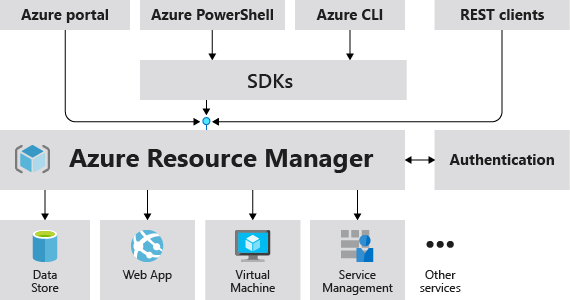
Azure SDK (Software Development Kit) is a software development kit provided to facilitate the easy use of Microsoft Azure services. Azure SDK offers various tools, libraries, and templates to simplify access and integration with Azure services. It includes packages compatible with different programming languages and platforms, enabling developers to utilize the services offered by Azure more efficiently.
Key Properties of Azure SDK
1. Language-Specific Libraries:
The Azure SDK provides pre-configured libraries for popular programming languages such as .NET, Java, Python, JavaScript/TypeScript. These libraries facilitate easy access to and interaction with Azure services.
2. Service-Specific Libraries:
There are special SDK libraries for each Azure service (Azure Storage, Azure Cognitive Services, Azure Key Vault, etc.). These libraries cover all the API functionalities of a specific service, allowing you to interact with the service easily.
3. Azure CLI and Azure PowerShell:
The Azure SDK also offers command-line tools (CLI) and PowerShell modules for managing Azure services. These tools help you manage Azure resources from the command line or scripts.
4. Azure DevOps Integration:
The Azure SDK can be integrated with Azure DevOps, simplifying CI/CD (Continuous Integration/Continuous Deployment) processes. This allows for the automation of continuous integration and deployment of your code.
5. Documentation and Examples:
The Azure SDK comes with comprehensive documentation and sample codes. This helps developers quickly learn how to use Azure services.
6. Security and Authentication:
The Azure SDK simplifies security and authentication when accessing Azure services. For example, it supports Azure Entra (Azure Active Directory) authentication.
Comparing Azure SDK with AWS SDK
The AWS SDK and Azure SDK are toolsets designed to provide access and integration with the services of their respective cloud platforms. Similarities include support for various programming languages, interaction with services through APIs, and advanced features such as automatic error management. Additionally, both SDKs offer strong support for essential functions like security, authentication, and configuration. However, there are also differences. The AWS SDK is optimized for services specific to the Amazon Web Services ecosystem and provides access to AWS's extensive range of services. On the other hand, the Azure SDK is designed for services offered by Microsoft Azure and offers tighter integration, particularly with Microsoft products and solutions. Furthermore, the Azure SDK provides deeper compatibility with Microsoft development tools like Visual Studio, whereas the AWS SDK generally offers broader platform support. These differences result in each SDK offering distinct advantages to users.
Conclusion
In summary, Azure SDK is a powerful tool that simplifies the use of Azure services and their integration. By using the SDK instead of REST API, you can write less code and access Azure services more quickly.

